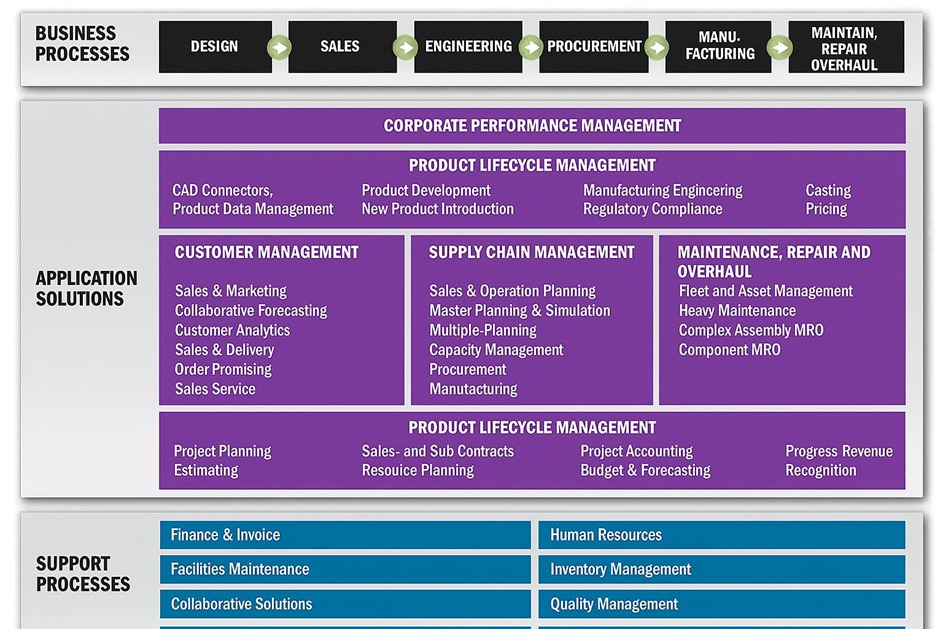Aerospace & Defense Industry Sector
- Home
- Aerospace & Defense Industry Sector
Why is ERP necessary in the defense industry sector?
The defense industry is a strategic sector that stands apart from all other industries due to its high precision, security standards, and complex project management requirements. Companies operating in this field must manage numerous critical processes in an integrated manner, from design to production, and from procurement to maintenance and logistics. Therefore, ERP (Enterprise Resource Planning) systems are not merely software in the defense industry they are one of the fundamental components of operational excellence.
In defense industry manufacturing, projects are often customized according to customer requirements. These projects involve long development cycles, high quality standards, and strict inspection processes. ERP solutions consolidate the management of these complex structures under a single system, ensuring traceability across all stages from design to delivery. In this way, engineering changes, production planning, supply chain management, and cost control can be carried out effectively.
One of the most critical aspects of defense industry projects is data security and traceability. ERP systems make it possible to record all processes in a secure environment and control them through project-based authorizations. In this way, both internal audit processes and compliance with external regulations are ensured.
Moreover, after sales support and maintenance management are of great importance due to the long life cycles of defense industry products. ERP systems enable maintenance planning, spare parts management, and service record tracking to be conducted through a single platform. This not only facilitates performance monitoring throughout the product’s life cycle but also enhances customer satisfaction.
Industry specific solutions like IFS ERP provide defense industry companies with an integrated structure in areas such as Project based manufacturing, engineering change management, configuration tracking, quality control, and document management. In addition, mobile applications allow real time management of field operations, thereby increasing operational efficiency.
In conclusion, in a sector like the defense industry, where high standards are essential, ERP systems are not merely tools for digitalizing processes they are a fundamental infrastructure that strengthens strategic decision-making, enhances efficiency, and provides a competitive advantage.
The Importance, Benefits, and Contributions of ERP in the Digitalization Process of the Defense Industry Sector
The defense industry possesses a strategic structure that sets it apart from other sectors, with its highly precise production processes, multi layered supply chains, and strict regulations. In today’s rapidly digitalizing world, data driven decision making, integrated process management, and operational efficiency have become necessities for defense industry organizations. At this point, ERP (Enterprise Resource Planning) systems form the foundation of digital transformation.
Integrated Process Management in the Defense Industry with ERP
Defense projects involve numerous interconnected processes such as design, prototyping, production, testing, maintenance, and logistics. Managing these processes manually or through fragmented systems can lead to disruptions in information flow and efficiency losses. ERP systems consolidate all these processes into a single centralized platform, providing end to end visibility from engineering to production, and from procurement to project management.
This enables both the efficient use of internal resources and the reduction of project delivery times. At the same time, ERP ensures that quality management, document control, and traceability standards can be maintained securely and consistently.
The Strategic Contribution of ERP in the Digitalization Process
Digitalization is not just about automation; it also means making smart and fast decisions based on accurate data. ERP systems provide defense industry companies with real time data analysis at every stage from production to after-sales service. This contributes to more accurate decision-making in strategic planning by top management.
Additionally, ERP integrates with artificial intelligence, IoT (Internet of Things), and Industry 4.0 applications in digital transformation to enhance production efficiency. Especially in the Project based manufacturing structure commonly used in the defense industry, the ERP system helps control project costs while optimizing resource planning.
The Role of ERP in Security and Compliance
In the defense industry, data security and regulatory compliance are as important as production quality. ERP systems ensure internal and external security through authorization levels, monitoring mechanisms, and audit trails. This enables easy compliance with both national and international defense standards (such as NATO AQAP, ISO 9001, etc.).
The Defense Industry Embracing Digitalization with ERP is Preparing for the Future
Digital transformation in the defense industry is one of the most effective ways to increase competitive power. ERP solutions form the backbone of this transformation, providing organizations with tangible benefits such as:
- Increased efficiency,
- Cost control,
- On-time delivery,
- Traceability and transparency,
- Enhanced customer satisfaction.
These are just some of the concrete advantages that ERP systems deliver.
Industry focused systems like IFS ERP offer a robust infrastructure tailored to the needs of defense manufacturers. Managing all processes digitally and in an integrated manner from design and production to maintenance, logistics, and project management supports companies in achieving their sustainable growth goals.
Most Commonly Used Modules in ERP Projects in the Defense Industry Sector
- Project Management (PLM/PDM)
- Production Management
- Supply and Logistics Management
- Quality Management
- Maintenance Management
- After-Sales Service
- Document Management
- Fleet and Asset Management
IFS ERP Solution Map for the Defense Industry:

